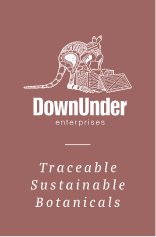Down Under Enterprises grows, produces, exports, and markets traceable
and sustainable native Australian essential oils and botanicals grown on our farm, Buhlambar, and from small growers across Australia producing unique essential oils and botanicals from plants native to Australia.
G’day mate,
This month we report on the results of our recent Customer Survey on Sustainability - an overwhelming response. Thank you to those who completed it. Interest in Sustainability activities has increased significantly, certainly around our farming practices, but also from Purchasing requesting information on our carbon emissions profile. As we write in this newsletter, sustainability goes beyond ‘environment’ to encompass other issues such as encouraging an inclusive culture and, importantly, human rights. These are certainly emerging trends for brands.
Our focus product this month is Manuka Oil, and we explore the wonderful collaborative work accomplished by traditional Maori land custodians in New Zealand. Manuka Essential Oil (from the same plant as the honey) has astonishing efficacy for problematic skin issues for anti-aging in combination with Vitamin C and as an antiviral boost for Acyclovir-resistant HSV-1 (cold sores).
We dive into these topics and more in this month’s newsletter.
Thanks for reading.
Sincerely,
Phil Prather

IN THE NEWS
Sustainability key driver for brands
The results of a recent in-house customer survey revealed that 88.57% of responding customers value the sustainability and traceability of ingredients over price. This is very welcome news for Down Under Enterprises as we continue significant business investment to assure our operations are aligned with our sustainability commitment.
EcoVadis, a platform for corporate social responsibility and sustainability, suggests there will be a heightened focus on human rights and workforce diversity at the brand and supplier level in 2021. Another critical area of change noted by EcoVadis involves organizations prioritizing Scope 3 (value chain) emissions reductions to drive lasting change in climate impact. A key learning from COVID-19 for EcoVadis members has been the need for more resilience and sustainable supply chains.

The cosmetics industry, skincare in particular, has demonstrated strong resilience during COVID-19 with brands establishing sustainable practices at every step in their supply chain, says Cosmetic Business Magazine. McKinsey & Company reported that the beauty sector is likely to return to 2019 sales revenue levels by the end of this year, while many other industries have a further horizon to reach pre-COVID-19 levels. The strong rebound of the cosmetics industry is thought to be driven by consumers’ new values related to environmental sustainability.
A Sustainability driver for brands has been the accelerating consumer interest toward environmentally sustainable products, often referred to as ‘green’ products. A recent empirical study found that greenwashing (a form of virtue-signaling by brands) - both directly and indirectly - negatively affects consumer green purchase behavior. The study highlighted that brands must avoid greenwashing to gain consumer trust.
How do you minimize greenwashing? It begins with transparency and sustainability at each step of the brand’s supply chain.

FARM UPDATES
Planting More Lemon Myrtle
We’re excited to announce additional plantings of Lemon Myrtle (Backhousia citriodora) at our farm.
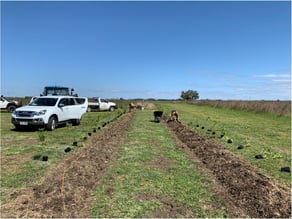
We are seeing high demand for our Lemon Myrtle Essential Oil – a highly therapeutic oil which has an aroma described as “more lemon than lemon”.
Traditional uses of Lemon Myrtle by Indigenous Australians include wrapping the leaves in paperbark to flavor fish dishes, and to treat headaches by crushing and inhaling the leaves. This oil has the highest citral content of any natural; at 90+% it is much higher than lemongrass. It is also considered to have a "cleaner and sweeter" aroma than comparable sources of citral.
Therapeutically, citral has been shown to exhibit sedative, antibacterial, antiseptic, antiviral, and antifungal properties.
Lemon Myrtle’s antimicrobial properties support its potential use as a 100% natural cosmetic preservative. And the hydrosol from this plant is AMAZING!

TRACEABILITY
Blockchain offers supply chain security
The Australian Tea Tree Oil Association (ATTIA), in conjunction with blockchain innovator GEORA, is developing an industry-first pilot trial of blockchain to overcome the significant traceability challenges faced with Essential Oils.
The Blockchain Traceability solution will be deployed via the Ethereum protocol that will support the entire supply chain for Australian tea tree oil – from growers to consumers - via a digital traceability and certification management tool.
This industry pilot is the first phase of a commercial solution that was first built for ATTIA but with the intent to champion a pathway toward digital trust for other agri-industries globally.
Download our White Paper on Block Chain for the Australian Tea Tree Industry.

EMPLOYEE PROFILE
Meet Rayssa, our Operations Assistant based in the Sydney office.
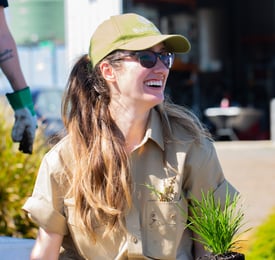
What is your role at Down Under Enterprises? I’ve been the Operations Assistant here for one year now and I love my job. I’m based in the Sydney office and my role involves many things (too many to mention), but primarily I organize product sample requests for customers, coordinate lab testing and do finance related administration.
What did you do before joining the team at Down Under? Immediately prior to this role I was a full-time mum. Previously, in Australia I worked in the Hospitality Industry and before that, in my native Brazil, I worked in Project Management.
What led you to want to work in the natural products industry? I’ve had an interest in natural products and sustainability since my days as student. When I was at University, I ran a sustainability project where we recycled the waste cooking oil used in local restaurants to produce soap. The project created work and income for people in the local community. It was a deeply rewarding experience for me.
What do you love most about what you do? I love that I’m involved in every department of the business, and of course the people that I work with – they’re the best. And I also love going to the farm during the planting and harvest seasons.
What’s your favorite way to spend the weekend? I like spending time at the beach with my son and playing the ukulele.

SUSTAINABILITY
Reclaiming the traditional way of Māori land ownership
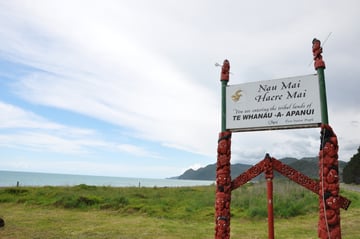
Prior to the arrival of European settlers, the Māori people of New Zealand had collective kaitiakitanga (guardianship) for the whenua (land) in their territory. No one person had ownership rights – everyone worked together to make the most of the whenua while ensuring its protection and sustainability for the future.
In 1840, The New Zealand government started acquiring Māori land through methods which caused conflict with the Māori people. By 1920, only around 8% of New Zealand land remained with the Māori people. The hapū (tribe/clan) connection with the whenua was forever changed. The Māori people were disconnected from their ancestral land.
This situation is changing; nowadays there are different types of Māori land, with different rules and protections on each type. Māori freehold land is now commonly held by multiple owners with different shareholdings.
Our Manuka is sourced under a fair share partnership model with Māori Kaitiaki in the East Cape region of New Zealand who are working the land of their ancestors. This partnership model provides shares and a fair and open return of the revenue gained from the Manuka Oil sourced from their whenua.
Read more: NZ Mānuka growers are revitalizing traditional (Māori) farming and healing practices
SCIENTIFIC PAPER
0.001% Manuka Oil reduces HSV-1 infectivity by >99%
Susceptibility to the Herpes Simplex Virus (HSV -1), responsible for common Cold Sores, can become both a chronic condition and, more frequently, drug resistant. Recent studies suggest Acyclovir-resistant HSV strains are susceptible to essential oils. The hypothesized reason for the efficacy of such essential oils is attributed to their complex chemical profiles and mode of action; substantially different to that of synthetic drugs.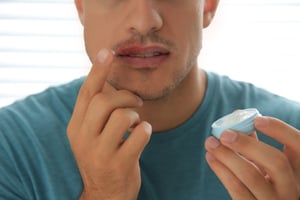
The antiviral potential of Manuka Essential Oil (Leptospermum scoparium) against herpes simplex virus type 1 (HSV-1) and three HSV-1 acyclovir-resistant isolates (HSV-1 isolates A, B, and C) was researched by Schnitzler, et al., and published in the German journal, Pharmazie.
The viruses were exposed for 1 hour to Manuka Essential Oil (0.001%) in suspension assays. Tubes containing virus and 1% ethanol were used as a control. Ethanol was chosen as the control because the initial dilution of the essential oil was always performed in ethanol and all assays contained up to 1% ethanol in the final concentration.
Manuka essential oil exhibited high levels of virucidal activity against HSV-1 as well against drug-resistant HSV-1 isolates in viral suspension tests. Manuka Essential Oil reduced the infectivity of acyclovir-sensitive as well as acyclovir-resistant virus isolates by > 99%.
The cost of adding Manuka to a lip balm product formulation, can be extremely reasonable. For a 5ml finished product, with Manuka Oil at 0.001% to achieve efficacy, the average cost of adding this effective concentration of Manuka Oil would be a mere 0.38 cents (¢) USD.
FEATURED PRODUCT
Manuka Essential Oil + Vitamin C in Skin Formulations
![]() Manuka is a powerful addition to skin formulations at only low concentration, with high skin tolerance and good cosmetic applicability. It has a synergistic action with Tea Tree for the treatment of acne. An exciting new area of research is the use of essential oils as synergists alongside synthetic ingredients. Essential oils do not exhibit the side effects often associated with synthetics, like bacterial resistance or disturbing the skin’s natural microbiome.
Manuka is a powerful addition to skin formulations at only low concentration, with high skin tolerance and good cosmetic applicability. It has a synergistic action with Tea Tree for the treatment of acne. An exciting new area of research is the use of essential oils as synergists alongside synthetic ingredients. Essential oils do not exhibit the side effects often associated with synthetics, like bacterial resistance or disturbing the skin’s natural microbiome.
While Manuka Essential Oil has been largely known as an antimicrobial, it is now being used in anti-aging formulations as an antioxidant and in combination with Vitamin C. Research suggests that Manuka can inhibit UVB associated inflammation in the skin.
Researchers in Korea published data on a nano-emulsion formulation containing manuka oil (10% by weight) as the main component, together with Vitamin C (ascorbyl tetraisopalmitate; 2% to 10% by weight) being used in cosmetic formulations, including skin creams, lotions, essences, and cosmetic powders. This formulation is active as a whitening, anti-inflammatory and anti-wrinkle agent. Treatment for 9 weeks with the Manuka Oil-Vitamin C nano-emulsion demonstrated increased thickness of the skin within 6 weeks, while the control showed no change.
Speak to us about Manuka or read more about this unique Essential Oil in one of our blogs.
WHY YOU SHOULD BE WORKING WITH MANUKA ESSENTIAL OIL
BENEFIT 1 –Effective at low concentration as an antiviral and antibacterial
BENEFIT 2 –Sustainable farming profile that benefits traditional landowners
BENEFIT 3 –Anti-ageing properties against UVB inflammation
BENEFIT 4 –Scientific literature available with more dedicated studies underway
